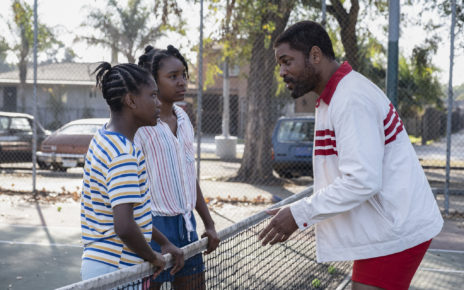What is it with movie romance these days? Have y’all forgotten how to endear yourselves to others? Writer/director Antoinette Jadaone seems to think that the way to a woman’s heart is an introduction that involves calling out a woman for factual error in a public place in front of tons of strangers while she’s doing her job. Well, gosh, what woman wouldn’t be turned on instantly?
You’re gonna think I’m kidding here, and I wish I were, but this was the actual, genuine meetcute: Christine (Liza Soberano) is a museum tour guide introducing the Juan Luna painting “Spoliarium” to a fruit rollup of school kids. She bothers pointing out the painting shares the same name as the song by Eraserhead, except for the spelling. Onlooker Raf (Enrique Gil), not on the tour, an on-the-spot self-proclaimed “E-head” challenges the statement, pointing out the song and painting are indeed spelled the exact same way. This argument goes on for a full page of dialogue.
Now, not to nitpick here, but … sometimes that’s what I do; especially when it’s important, as this is. This is the critical step of boy and girl falling in love, so I want to believe it. It seems pretty unlikely the standard tour of 19th century Filipino murals would include a discussion of the rock band Eraserheads any more than it would include commentary regarding Beatlemania, hence this tour snippet addition was likely the invention of the tourguide herself. This begs more questions: Why would Christine believe prepubescent grade school kids would give a crap about Eraserheads? And why did Christine care enough about the detail to include it in her tour yet still get it wrong? Of course, those are all petty concerns; the key one plaguing this writer is: “Why in the world of Carmen Sandiego would a woman fall for a man who corrected her in this fashion?” Have you ever fallen in love with an online troll? What would that look like … ? “Oh, after that man corrected my grammar and clarified a fact about Planned Parenthood I was totally smitten!”
So, I wasn’t fallin’ for it from the get go. After that, however, it got a little easier. Raf likes Christine; Christine likes Raf, but goshdarnit, these two crazy kids just can’t make it work out. It helps that the screenplay seems to work against them. Despite the “Spoliarium” idiocy, Christine is a gifted student, so she graduates and takes a job at a bank where her boss embezzles funds and skips town. Left holding the bag, Christine takes the blame for not speaking up about what was going on. This confused me … was she in-on-it or not by legal standards? The film suggests that Christine knew about it, but was innocent, leaving her with no formal punishment but a “black mark” proving difficult for her to find work. That’s not how the law works; you’re complicit or you aren’t; there’s no exonerating “partial complicity.” If you know your boss plans to murder somebody and then does and you didn’t tell anybody, you are complicit on some level.
Imagining the legalities away, this incident destroys Christine and Raf. I’m still not sure why. He loves her, but now she has to avoid him because … career? The real reason is if they stick together through the pain, then there isn’t a movie. And there probably shouldn’t have been. Alone/Together plays like an ill-conceived remake of When Harry Met Sally… It may draw a smile or a tear or two, but it isn’t terribly substantial and got little reaction from yours truly, who is a sucker for unattainable romance. I try not to go full inductive on these things, but truth is if you keep possible love from happening and I’m not invested in your story, then you’re doing something wrong.
A director named Antoinette Jadaone
Told a story of romance unknown
Her self-written tragic
Lacked screenplay magic
Next time, write Together, not Alone
Not Rated, 103 Minutes
Director: Antoinette Jadaone
Writer: Antoinette Jadaone
Genre: Romance of the unlucky
Type of being most likely to enjoy this film: Utterly hopeless romantics
Type of being least likely to enjoy this film: Not quite utterly hopeless romantics




